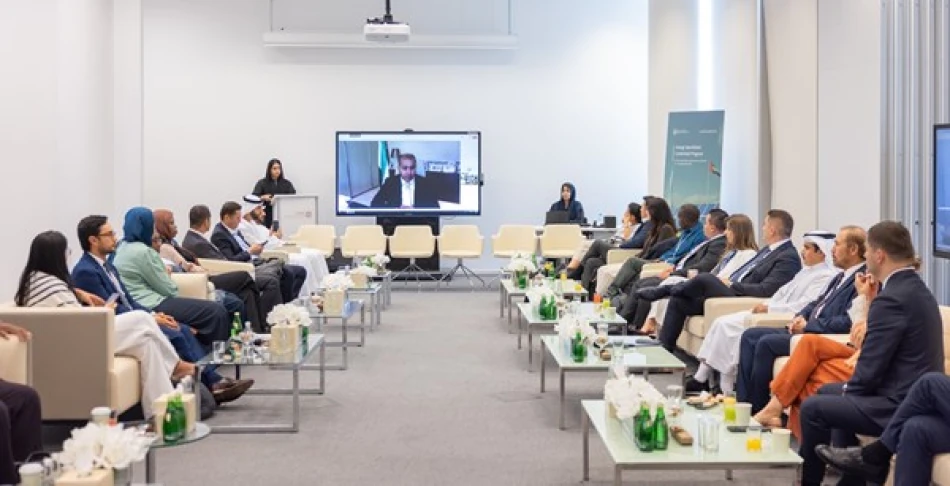
Barakah Nuclear Power Plant's Contributions Showcased to International Delegation by UAE Nuclear Regulator
UAE Positions Itself as Global Nuclear Energy Mentor as 19 Nations Study Emirates Model
The United Arab Emirates is leveraging its successful nuclear program to establish itself as a leading authority in peaceful nuclear energy development, hosting senior officials from 19 countries to showcase how emerging nations can build world-class atomic capabilities. This diplomatic initiative signals the UAE's ambition to export its nuclear expertise and potentially secure lucrative consulting contracts as global energy security concerns drive renewed interest in atomic power.
Barakah Plant Becomes Regional Showcase
The UAE's Federal Authority for Nuclear Regulation welcomed 31 high-level officials as part of an international energy leadership program, highlighting the Emirates' transformation from nuclear newcomer to regional pioneer. The Barakah Nuclear Power Plant, the Arab world's first commercial nuclear facility, now serves as a tangible example of how oil-rich nations can diversify their energy portfolios while maintaining strict safety standards.
The four-reactor Barakah complex represents more than just energy infrastructure—it's a geopolitical statement. By completing the project according to international standards, the UAE has demonstrated that Middle Eastern nations can successfully manage complex nuclear programs without triggering proliferation concerns.
Regulatory Framework Becomes Export Product
The visiting delegation received comprehensive briefings on the UAE's integrated nuclear oversight system, covering safety protocols, security measures, and non-proliferation safeguards. This regulatory architecture, developed with extensive international consultation, now positions the Emirates as a potential mentor for other developing nuclear programs.
Ambassador Hamad Al Kaabi, the UAE's permanent representative to the International Atomic Energy Agency, emphasized the country's readiness to share its experience with nations planning nuclear programs. This knowledge-transfer approach mirrors successful models from established nuclear powers like France and South Korea, which have built substantial export businesses around their domestic nuclear expertise.
Future Technologies in Focus
Beyond current operations, the UAE showcased its forward-looking nuclear strategy, including investments in cybersecurity, artificial intelligence applications, and small modular reactors. This technological diversification suggests the Emirates is positioning itself not just as a regional nuclear operator, but as an innovation hub for next-generation atomic technologies.
The emphasis on waste management and emergency preparedness also addresses two critical concerns that have historically deterred developing nations from pursuing nuclear power. By demonstrating comprehensive solutions to these challenges, the UAE is effectively lowering barriers for other countries considering nuclear programs.
Climate Goals Drive Nuclear Renaissance
The Barakah plant's contribution to the UAE's 2050 carbon neutrality strategy reflects a broader global trend toward nuclear power as a climate solution. Unlike solar and wind power, nuclear energy provides consistent baseload electricity that complements rather than competes with oil and gas exports—a crucial consideration for Gulf states managing energy transitions.
This positioning could prove particularly attractive to other resource-rich developing nations seeking to maintain fossil fuel export revenues while meeting international climate commitments. The UAE's model demonstrates how nuclear power can serve as a bridge technology during extended energy transitions.
Geopolitical Implications
The international delegation's visit occurs amid heightened global focus on energy security following recent geopolitical disruptions. Countries seeking to reduce dependence on energy imports are increasingly viewing nuclear power as a strategic asset, creating potential market opportunities for nations with proven nuclear capabilities.
The UAE's emphasis on transparency and international cooperation also serves broader diplomatic objectives, reinforcing the country's image as a responsible regional power. By opening its nuclear facilities to international scrutiny, the Emirates is building credibility that could translate into expanded influence in global energy governance.
For the 19 visiting nations, the UAE experience offers a roadmap for nuclear development that balances ambitious energy goals with rigorous safety standards—a combination that could reshape the global nuclear landscape in the coming decades.
Most Viewed News

 Layla Al Mansoori
Layla Al Mansoori






